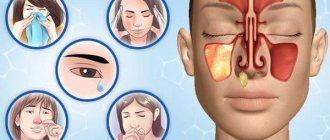11.02.2016
Maltseva Marina Arnoldovna
Head of the consultation department - neurologist, specialist in the field of extrapyramidal pathologies, doctor of the highest category
Shabunina Ekaterina Mikhailovna
Neurologist, category 2
Migraine during pregnancy can occur even in women who have not previously suffered from this disease. About 25% of expectant mothers experience migraine with aura. It is difficult to even imagine how difficult it is for pregnant women to endure the terrible symptoms of migraine, since their body is already in critical condition. If you can no longer endure the pain, you should find a way out that would not harm either the pregnant woman or the baby.
Migraine during pregnancy
Migraine is a hereditary disease that is expressed as a sharp pain sensation. The headaches are unbearably strong, they are too tough for ordinary pills, such as No-Shpa, Paracetamol, etc. Migraine in pregnant women is accompanied by certain factors called “auras”. This:
- Fearful attitude towards light.
- Intolerance to strong smells and loud sounds.
- Closed state.
- Unbearable nausea and even vomiting.
Very often, pregnant women accept all these symptoms as a normal malaise, and use Citramon, or apply a cool compress.
Read also
Temporomandibular joint dysfunction
Symptoms of dysfunction of the temporomandibular joint Among all the lesions of the mandibular joint, one can note myofascial pain click syndrome of the masticatory muscles, which characteristically translates…
Read more
Trigeminal neuralgia
Trigeminal neuralgia is a chronic disease characterized by excruciating paroxysmal shooting pains in the area of innervation of one or more branches of the trigeminal nerve. Neuralgia…
More details
Orgasmic or coital headache
Orgasmic pain occurs during sex. This form of headache occurs more often in males. Symptoms of orgasmic headache: acute (paroxysmal) headache *throbbing…
More details
Monoclonal antibodies against migraine
About 11% of people in the world suffer from migraines, and a third of them are forced to stay in bed during attacks. This significantly reduces the quality of life: it interferes with work, communicating with friends and engaging in hobbies.…
More details
Headache due to neuralgia of the greater occipital nerve
Headache caused by neuralgia of the greater occipital nerve occurs in 40% of patients. This is a signal from the body about the presence and development of serious problems. Unpleasant sensations are often confused by sufferers...
More details
Why do pregnant women get migraines?
Each organism has its own reasons for this or that process, but there are common reasons why unbearable headaches appear during pregnancy. These include:
- Eating too much chocolate, cheese or citrus fruits.
- Insufficient amount of water in the female body.
- Significant overdose of drugs.
- Constant lack of sleep, worries and stress.
- The body's reaction to the weather outside the window.
- Significant weight gain.
- Use of hormonal drugs.
- Violations of the general regime.
- Hypothermia or, conversely, overheating of the body.
“Migraine during pregnancy, what to do?” – the answer to this question may also be taking a cold shower. The water temperature should be about 21-26 degrees, but being under water should not be longer than 5 minutes.
Migraine during pregnancy. How to treat?
Anti-migraine medications should be used with great caution and only after consulting a doctor. During pregnancy, a woman's body can react differently to one drug or another, so you need to be extremely careful about what you take. Only qualified doctors can determine what is possible for migraines during pregnancy, since they have the necessary knowledge and practice.
Having figured out what kind of phenomenon migraine is in pregnant women and how to treat it, a few words need to be said about prevention. It is best to build a daily routine and stick to it, yoga for pregnant women will not harm anyone to keep your body in good physical condition. A head and neck massage will be helpful, and most importantly, eat what your body requires and drink plenty of water.
Clinical Brain Institute Rating: 3/5 — 7 votes
Share article on social networks
Causes of headaches during pregnancy in the 1st trimester
Headaches during pregnancy in the first trimester are a common occurrence. During this period, they can appear even in those women who have not previously complained of this symptom. Pregnancy is stressful for the body, so the first 3 months may be accompanied by poor health. Headache may occur for the following reasons:
- nervous, emotional stress, worries;
- intense physical activity and chronic fatigue;
- sleep disorders, insomnia;
- poor nutrition, consumption of large amounts of coffee, salt, fried and starchy foods, as well as overeating;
- insufficient physical activity.
Headaches that occur in the absence of organic disorders often go away on their own. Doctors recommend maintaining a sleep and exercise schedule, making healthy diet choices, and avoiding foods that may trigger migraine attacks. This list is individual, but often it includes coffee, fatty foods and sweets in large quantities.
Hormonal changes
Headache in the first trimester of pregnancy is often caused by hormonal changes. During this period, the level of progesterone increases sharply - it is necessary to prepare the body for pregnancy. It causes a decrease in the reactivity of the immune system, due to which the fetus is not identified as a foreign body and is not rejected. Progesterone is maximally increased in the first trimester, and can cause swelling, water-salt imbalance and severe headaches.
In the first trimester, there is also an increase in estrogen levels. These hormones cause an acceleration of metabolic processes and also reduce vascular tone. These substances normally help lower blood pressure and reduce the manifestations of hypertension, but with hypotension they can provoke a headache attack.
Toxicosis
Early toxicosis is considered a normal manifestation of pregnancy and occurs in many women, but in some cases it requires more detailed diagnosis from a doctor. It is a reaction of the immune system to the appearance of an embryo - it is perceived by the body as a foreign protein. The exact cause of toxicosis is unknown, but there are several theories of its origin. The first is associated with hormonal changes during pregnancy, which cause digestive disorders and headaches. The second explains the deterioration in health by the adaptation of the immune system to changes in the body. There is also a neuro-reflex theory: in the first trimester, activation of some subcortical centers of the brain occurs, which are responsible for the manifestation of protective reflexes, including the vomiting center.
Toxicosis is manifested by a complex of characteristic symptoms:
- indigestion, frequent nausea and vomiting;
- increased sensitivity to light, smells and other irritants;
- headaches, dizziness;
- at an advanced stage - a decrease or increase in blood pressure, heart rhythm disturbances, acetonuria.
In the first trimester of pregnancy, toxicosis is a normal reaction of the body. By the second trimester, its manifestations disappear on their own. You should consult a doctor if toxicosis is accompanied by constant headaches, weight loss and other dangerous manifestations. Also, it is not considered the norm in later stages - in this case, the doctor may decide on inpatient observation.
Migraine
Attacks of acute headaches that occur without a specific reason are migraines. It occurs in men and women of any age and is not associated with organic disorders. Migraine may be associated with cerebrovascular insufficiency and other factors. Attacks are often triggered by hormonal imbalances, external irritants, stress and physical activity, as well as certain weather conditions. Headaches can occur suddenly, but many patients initially experience warning symptoms (migraine aura). These include:
- changes in sensitivity to light, smells;
- indigestion, nausea and vomiting;
- hearing loss, tinnitus;
- numbness of the upper extremities, decreased sensitivity of the fingers.
Aggravation of migraines can be caused by changes in hormonal balance during pregnancy. In this case, observation by a doctor is recommended. To eliminate headaches, you may need to systematically take an anti-migraine drug.
Blood pressure and headaches during pregnancy in the 1st trimester
One of the causes of headaches that can worsen during pregnancy is increased blood pressure (hypertension). It occurs in various vascular diseases, including atherosclerosis, inflammatory processes, weakness of vascular walls and other pathologies. Hypertension is dangerous due to increased stress on the walls of the arteries, as a result of which they become less elastic and less adaptable to changes in blood pressure. As a result, rupture of blood vessels with hemorrhages may occur, the consequences of which depend on the location of the damaged area.
When blood pressure rises, the following symptoms occur:
- acute throbbing headache, which can concentrate in the temples or spread to the entire surface of the head;
- heart rhythm disturbances;
- skin redness;
- nausea and vomiting;
- nervous manifestations, including exacerbation of reactions to bright lighting and odors, changes in skin sensitivity.
During pregnancy, an exacerbation of hypotension - a decrease in blood pressure - is also possible. Its causes include impaired nervous regulation, vascular disease, vitamin deficiency, stressful situations and heart pathologies. Attacks of the disease are manifested by weakness, drowsiness, nausea and headache, as well as pallor of the skin and mucous membranes. Many patients are diagnosed with chronic hypotension. In the first trimester of pregnancy, its exacerbation may occur due to the intense blood supply to the placenta. In this case, it is recommended to monitor your well-being, follow the diet recommended by your doctor, and a schedule of rest and physical activity.
Blood glucose surges
Hypoglycemia is a dangerous condition in which there is a decrease in blood glucose levels. This element is necessary for the normal course of biochemical processes at the cellular level, and is especially important during pregnancy, for proper nutrition of the placenta. Glucose deficiency leads to insufficient energy metabolism, resulting in a sharp deterioration in well-being. Frequent attacks of hypoglycemia are dangerous both for the patient’s health and for the development of the fetus. They are accompanied by the following symptoms:
- aching headache, dizziness;
- decreased blood pressure, pallor;
- nausea, indigestion;
- mood swings, irritability, drowsiness;
- With a sharp decrease in glucose levels, fainting may occur.
Hyperglycemia is an excess of the permissible level of sugar in the blood. It presents with a characteristic set of symptoms that include weight loss, headaches, drowsiness, increased need for fluids and frequent urination. It can occur after overeating, due to stressful situations and irregular physical activity, and is also diagnosed in diabetes mellitus. If the endocrine system is disrupted, pregnancy must be carried out under the supervision of a doctor, if necessary, subject to systematic use of medications to control blood glucose.
Other reasons
A severe headache during pregnancy in the 1st trimester is not a disease, but a manifestation of a number of disorders. They may be associated with the reaction of the immune system, hormonal changes, stress, nervous and emotional tension. However, it can also be a sign of dangerous disorders and chronic diseases that affect the course of pregnancy and require constant monitoring. So, during pregnancy in the first trimester, headaches occur for the following reasons:
- neurological diseases;
- impaired cerebral circulation and the appearance of areas of ischemia (oxygen deficiency in tissues);
- chronic renal or liver failure;
- diseases of the cardiovascular system;
- consequences of injuries in the back and neck, concussion;
- pathologies of the endocrine system, hormonal imbalance;
- stroke, aneurysm and other acute conditions.
If you feel nauseous and have a headache during early pregnancy, this can be considered normal. This reaction of the body occurs with increased sensitivity of the immune system, but goes away by the second trimester after an adaptation period. However, it is important to monitor your well-being and consult a doctor if other alarming symptoms appear: surges in blood pressure and glucose levels, pain in the heart, fainting.









